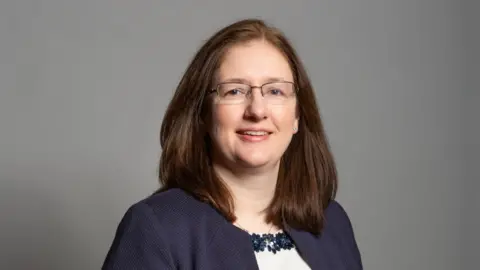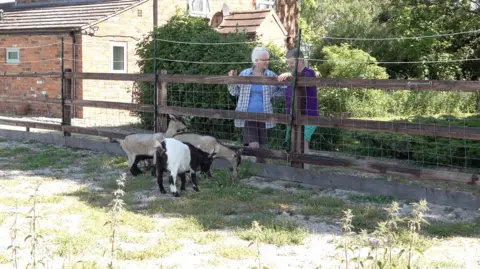Retired couple 'devastated' by solar farm plans
 BBC
BBCA couple said plans that would leave their rural retirement cottage "surrounded by 15ft (4.5m) solar panels" were "devastating".
Mandy Goodhand and Stevie Johnson-Mansley bought their cottage in rural Lincolnshire in 2020 to renovate and retire to.
However, three years later they received a "knock on the door" from a local farmer to inform them the surrounding fields were being leased to make way for solar panels.
The couple's MP Dr Caroline Johnson, the Conservative MP for Sleaford and North Hykeham, has secured a debate on the impact of large scale solar farms in the House of Commons later.
"I will be putting forwards the concerns both I and my constituents share about large-scale solar farms and their impact on agricultural land and our local area," she said.

Five large solar farms have already been approved for Lincolnshire.
These include the Mallard Pass project which spans two counties and was strongly opposed by local residents.
There are at least nine other solar projects planned in the county, including one near Mandy and Stevie's home in Howell Fen near Heckington.
Developer Low Carbon wants to build the solar farm, known as the Beacon Fen Energy Park, which would be capable of powering up to 130,000 homes.
The couple said it would lead to their rural smallholding being "dominated" by solar panels.
Stevie, a retired nurse, said she felt there was little they could do to stop the proposal.
"It does appear that these projects are just being rubber-stamped, to be honest. I don't think local people's views come into it."
 House of Commons
House of CommonsMandy and Stevie welcomed the parliamentary debate on solar energy being led by their local MP.
Mandy said: "The bigger concern, apart from our own, is that land is being taken away - land that would normally be used for food."
Writing on her Facebook page, Johnson outlined the scope of Thursday's debate.
"I will be raising the cumulative effects of these proposals, the threat to our food security, the human impact on the villages the panels will surround and modern slavery concerns surrounding the production of solar panel components."
Low Carbon said it had "engaged with many local residents" to mitigate some of the impacts of its proposals and "better understand their concerns".
A spokesperson said "the land take involved for solar developments is minimal in the context of food production" and said the solar industry was playing "an important role in keeping farms viable".

Large solar farms are classed as Nationally Significant Infrastructure Projects (NSIPS) which means they are ultimately decided on by government ministers rather than local councils.
A spokesperson for the Department for Energy and Net Zero said the amount of farmland being used by solar projects should not be a concern.
"As of September last year, solar farms covered around 0.1% of the total land area of the UK," they said.
The spokesperson added: "Projects are subject to a rigorous planning process in which the views and interests of the local community and impacts on the local environment, including any impact on amenities, landscapes and land use, are considered."
Listen to highlights from Lincolnshire on BBC Sounds, watch the latest episode of Look North or tell us about a story you think we should be covering here.
